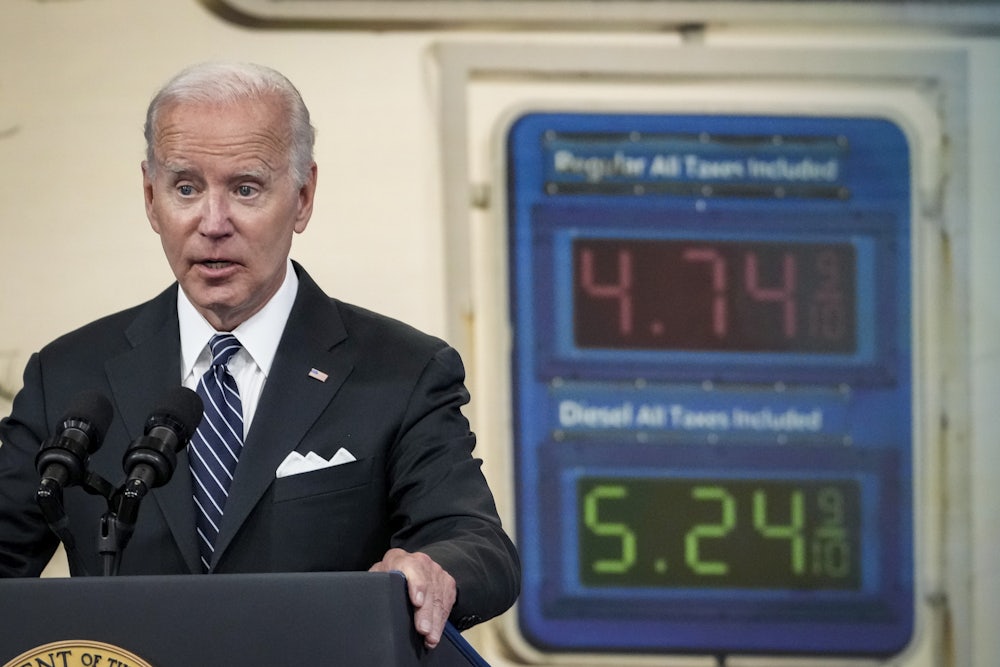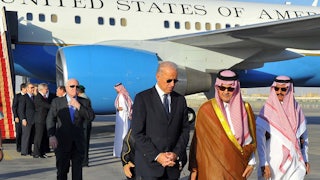Smiling as he opened with a quotation by Voltaire about the relationship between absurdity and atrocity, Joe Biden delivered passionate remarks about America’s Middle East policy. President Biden? No—the year was 1986, and the Delaware senator’s position was clear. “One of the absurdities is the mythical notion that the Saudis, even if they were so predisposed, are able to be agents of change, and able to be agents of U.S. interests in the Persian Gulf region,” he told his Senate colleagues. Speaking about what he called an “80-member family oligarchy,” Biden said that it was “totally unrealistic to expect the Saudis, with or without our help in terms of arms sales, to do anything other than maintain a policy which they have had, which is one that is not particularly helpful to our interests.”
Biden’s feelings about the Saudi regime have not changed much in the ensuing decades. During a Democratic Party presidential candidate debate in 2019, he promised to make the government “a pariah” and said he would refuse to send it more weapons. He started to make good on that promise as president when, in early 2021, his administration banned 76 Saudi citizens from entering the United States, with Secretary of State Antony Blinken saying they were “individuals who, acting on behalf of a foreign government, are believed to have been directly engaged in serious, extraterritorial counter-dissident activities.”
Last week, however, the White House announced that Biden is looking forward to visiting Jeddah next month, since the Saudi government “has been a strategic partner” of the U.S. for almost 80 years. The U.S. has continued to funnel arms to Saudi Arabia, more than $1 billion worth since September alone. And Khalid bin Salman, the country’s deputy defense minister, visited Washington in May to meet with high-level White House and Pentagon officials.
The Biden administration’s obvious turnaround on Riyadh has garnered criticism from advocates of a human rights–oriented foreign policy and from those who think the administration will have little to show for its groveling. “If you’re going to compromise on your principles in such a blatant way, it should be clear that there are concrete benefits in return,” says Dalia Dassa Kaye, senior fellow at UCLA’s Burkle Center on International Relations. Others say the real problem is not that Biden has failed to make good on his campaign promises but that he overpromised in suggesting that he could single-handedly ostracize a longtime U.S. client state. Either way, it’s clear that Biden has been unsuccessful in establishing a consistent, clear policy.
The Biden team’s mishandling of Saudi Arabia is emblematic of their failure in the entire Middle East. Whereas they have accomplishments in other areas—resisting Russian aggression Ukraine without escalating the conflict, solidifying relationships with our closest European allies, and avoiding fighting any needless wars—the current administration’s policies in the Near East have been reliably ineffective. With Iran inching toward obtaining nuclear weapons even as Israel assassinates the Islamic regime’s scientists (while its first non-Netanyahu government in years is collapsing), the region is dangerously unstable. If Biden doesn’t shift course, he could find himself sinking in the Middle East, like so many presidents before him.
Biden is the first Democratic president since Lyndon Johnson—president when Israel conquered and began occupying the Gaza Strip, the West Bank, and the Golan Heights—to not engage in any attempt at reconciling Israel and the Palestinians. Although the administration continues to utter anachronistic cliches about the two-state solution, the U.S. resorts to begging its longtime “ally” to refrain from taking any further unilateral actions against the Palestinians that would cause embarrassment, and to remaining quiet when Israel kills prominent Palestinian-American journalists.
Biden has never shown much sympathy for the Palestinians during his long career, so his indifference to their plight as president is perhaps to be expected. More surprising has been his bungling with Iran. Coming to office following Donald Trump’s awful decision to unilaterally withdraw from the Iran nuclear deal that President Barack Obama signed, the Biden administration could have immediately rejoined the agreement. Instead, Blinken and others insisted that the deal needed to be more comprehensive, addressing Iran’s missile defense program, cyberweapons, drones, and support for militants elsewhere. But Iran had little interest in that broader agreement, especially considering that Republicans didn’t even stick to the more minimalist pact Obama had signed. A year and a half later, the U.S. is no closer to obtaining the wider deal with Iran it wanted—in fact, Iran is closer to developing nuclear weapons than before—and Iranians have continued to suffer the brunt of ever more brutal sanctions.
The U.S. has paid a cost for its erratic behavior. When Obama and Iranian leaders announced their agreement in 2015, America’s longtime allies initially were outraged. Israel’s then–Prime Minister Benjamin Netanyahu called it a “historic mistake,” while officials from Saudi Arabia, Bahrain, and the United Arab Emirates expressed similar concerns. In response, American leaders have made significant efforts to mollify them. Washington’s support for Saudi Arabia’s vicious war in Yemen was delivered mostly to reassure Riyadh that we have not abandoned their security concerns. And of course, Trump reneged on the entire Iran deal anyway, courting the Saudis and other traditional U.S. allies.
But the U.S. has not regained its credibility with the Gulf states. “There is an unwillingness to understand that the region has moved on,” says Esfandyar Batmanghelidj, CEO of the London-based Bourse & Bazaar Foundation, a think tank. The countries in the region will no longer support whatever directives Washington delivers. “The administration’s instincts are to return to the old playbook where the U.S. provides the architecture of security arrangements,” says Batmanghelidj. But that is no longer an option, since countries feel they cannot rely on the changing whims of America. “They’re the ones who are really vulnerable to Iran, not us,” says Kaye.
Making matters worse, the situation in Israel is getting even more complicated. The country’s current government has collapsed, and the upcoming fall election could conclude with Benjamin Netanyahu returning to power. Biden has been content to let the awful situation in Israel-Palestine police itself, but having the volatile Netanyahu back in office may force the U.S. to become more involved in one way or another.
The good news is that some countries in the Middle East are by themselves doing what the U.S. should have been encouraging all along: moving toward better relations that could eventually lead toward erecting a stable balance of power upheld not by the U.S. but by the local players.
Remarkably, Saudi Arabia and its longtime rival Iran are already engaging in extensive talks. The UAE has similarly moved toward a rapprochement with Iran. And the Gulf states, plus Jordan and Egypt, have urged the U.S. to rejoin the Iran deal that several of them once maligned. “They’re de-escalating and reaching out to Iran already,” says Kaye. Similarly, the Saudi Crown Prince Mohammed bin Salman is also visiting Turkey, resuming ties that have been broken down for several years. These advances offer opportunities for the U.S. to help reduce conflict in the Middle East. “We should be empowering regional actors to take responsibility for their own security, which would reduce the U.S. footprint,” says Batmanghelidj.
Simply by standing back and allowing (or better yet, applauding) hostile countries to engage with each other and discuss power sharing, the U.S. can find itself in a much better spot than if it insists on building an anti-Iran alliance. But to reap the benefits, it would have to engage in more nuanced relationships and refrain from dividing up the states in the region into the binary where they are either complete pariahs or security pillars for the U.S. It’s not clear that is possible anymore, for Biden or anyone else in Washington.






